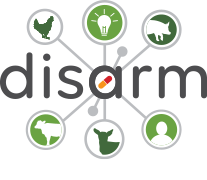In this section
In this section
Environment
Providing animals with a clean, dry, comfortable environment which provides for their physical, social and mental needs can improve production, health and welfare by reducing negative stress.
Using appropriate disinfectants, bedding and flooring substrates is important for maintaining clean, dry, comfortable housing. Management routines that include regular cleaning, removal of waste and topping up of clean, dry bedding and litter materials can help limit disease transmission. Animals should be provided with adequate space and facilities in which to rest, exercise and perform species-typical behaviours. Suitable social and environmental enrichment encourages rewarding physical and mental stimulation and grooming activities which can buffer the effects of stressful situations and reduce abnormal behaviours and associated injuries. However, it is important to consider how to provide suitable social environment without compromising health e.g. by avoiding overstocking, keeping social groups stable, and adhering to good hygiene and biosecurity measures. Providing an environment in which animals are happy, comfortable and content can contribute to lower susceptibility to disease and easier management.

